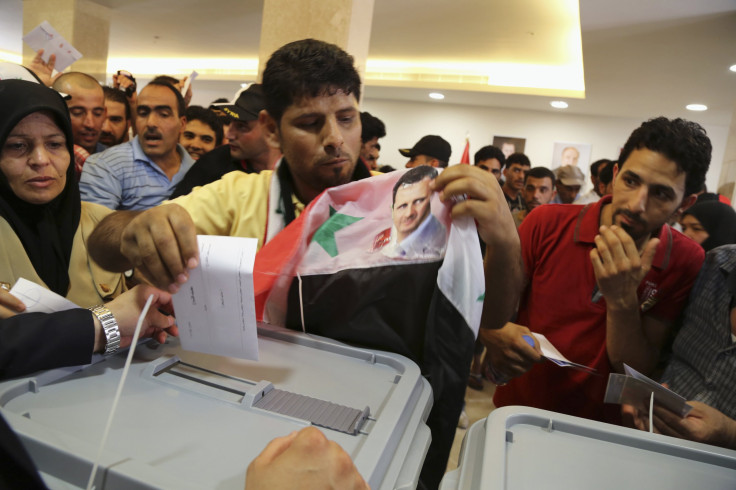As Syria Presidential Election Begins, Survivors of Chemical Attack Shun Vote In Disgust

The sounds Qusai Zakarya heard the morning of Aug. 21, 2013, in Moadimiyeh, Syria, near Damascus, were not what he was used to. The bombs, he said, sounded different -- they didn’t buzz and crash in the same way they had in the slew of previous regime bombardments, and the people running for cover were holding their eyes, falling and vomiting. Those were signs that the international community and human rights organizations said were indicative of a chemical attack.
Now, nearly a year later, the man behind the attack, President Bashar Assad, is standing for re-election in what’s widely seen as a sham. And Zakarya is in the U.S., working to prove to Western leaders that what he saw that day was real, and that Assad needs to be removed from power.
Wednesday marked the first day Syrians living outside of the country could cast their ballot in the presidential election that no one expects Assad to lose. Tens of thousands voted, many of them at the Syrian Embassy in Beirut. According to Reuters, refugees said that pro-Assad Lebanese groups had mobilized them to go vote. Syrian state television said voting took place in 43 embassies. Many of those who visited polling stations said the organization, especially in Lebanon, was a mess and there was very little oversight. But Zakarya refused to vote in what he called “a disgusting and pathetic joke.”
“I can understand that some people will be forced to elect Assad, or be killed or captured,” he said. “But everyone I know is not voting.”
According to United Nations estimates, more than 150,000 Syrians have been killed and 5 million displaced, including more than 2.8 million refugees, since the conflict began three years ago.
Voting will begin for those still living inside Syria on June 3, but many will boycott the vote unless they will be forced to go, Zakarya said.
“I think there will be people voting, especially in Damascus, because it is a fortress for the regime,” he said.
Assad has two opponents in the race for president -- Hassan Abdullah al-Nouri of Damascus and Maher Abdul-Hafiz Hajjar of Aleppo, both lawyers who have are not well known and have been unable to run proper campaigns in the war-torn country.
If Assad wins with the near-100-percent landslide expected, the international community will need to reassess how it will deal with the crisis in Syria. So far, it has been unable to come to an agreement on how to move forward.
Russia and China vetoed a U.N. Security Council resolution on May 22 that would have referred the Syrian crisis to the International Criminal Court for investigation of possible war crimes and crimes against humanity, without specifically targeting either the regime or the opposition.
The international community and various human rights organizations determined that the bombs launched by the regime on Moadimyeh in August were filled with gases that killed more than 1,000 people, including children, a war crime under international law. Despite the Syrian government’s agreement to rid the country of its chemical weapon stockpiles, the military is still allegedly using chemicals as weapons nearly one year later, and it is unclear if anything can be done to stop it. Experts say the regime is likely to keep its grip on power and continue to attack rebellious areas like Moadimiyeh as Assad takes another term in office.
But the Security Council is divided over the crisis in Syria, which has led to deadlock on several resolutions drafted to bring an end to the crisis. Syria is not party to the Rome Statute that originally established the International Criminal Court; therefore, the only way it can be referred to the court is through the Security Council.
Zakarya attended the May Security Council session after meeting with U.S. Ambassador to the UN Samantha Power, who asked him to write down what he would say if given the opportunity to testify as a witness at the ICC.
“I told her about small kids that I was trying to help during the chemical attack and what it felt like for me to witness it,” he said. Zakarya said he told Power about how he had to bury a man who was detained and tortured while trying to visit his daughter in the hospital after the attack, and about an 18-month-old girl who died, he said, from malnutrition because of the government siege of the town.
Allegations that the Syrian regime is continuing to use chemical weapons, including chlorine, forced inspectors from the Organization for the Prohibition of Chemical Weapons to return to the country. Syria has a June 30 deadline to destroy all of its stockpiles, but it is unclear, especially with anticipated violence around the elections, that the government will follow through.
With the continued threat of chemical weapons, Zakarya said the people he is in touch with back home fear another attack like the one they experienced last summer, but “people are trying to move on with their daily lives,” he said.
© Copyright IBTimes 2025. All rights reserved.





















